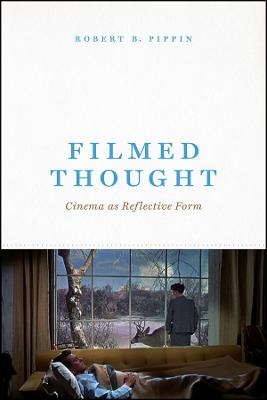
Filmed Thought
Cinema as Reflective Form
Seiten
2019
University of Chicago Press (Verlag)
978-0-226-67195-6 (ISBN)
University of Chicago Press (Verlag)
978-0-226-67195-6 (ISBN)
With the rise of review sites and social media, films today, as soon as they are shown, immediately become the topic of debates on their merits not only as entertainment, but also as serious forms of artistic expression. Philosopher Robert B. Pippin, however, wants us to consider a more radical proposition: film as thought, as a reflective form. Pippin explores this idea through a series of perceptive analyses of cinematic masterpieces, revealing how films can illuminate, in a concrete manner, core features and problems of shared human life.
Filmed Thought examines questions of morality in Almod var's Talk to Her, goodness and naivete in Hitchcock's Shadow of a Doubt, love and fantasy in Sirk's All that Heaven Allows, politics and society in Polanski's Chinatown and Malick's The Thin Red Line, and self-understanding and understanding others in Nicholas Ray's In a Lonely Place and in the Dardennes' oeuvre. In each reading, Pippin pays close attention to what makes these films exceptional as technical works of art (paying special attention to the role of cinematic irony) and as intellectual and philosophical achievements. Throughout, he shows how films offer a view of basic problems of human agency from the inside and allow viewers to think with and through them. Captivating and insightful, Filmed Thought shows us what it means to take cinema seriously not just as art, but as thought, and how this medium provides a singular form of reflection on what it is to be human.
Filmed Thought examines questions of morality in Almod var's Talk to Her, goodness and naivete in Hitchcock's Shadow of a Doubt, love and fantasy in Sirk's All that Heaven Allows, politics and society in Polanski's Chinatown and Malick's The Thin Red Line, and self-understanding and understanding others in Nicholas Ray's In a Lonely Place and in the Dardennes' oeuvre. In each reading, Pippin pays close attention to what makes these films exceptional as technical works of art (paying special attention to the role of cinematic irony) and as intellectual and philosophical achievements. Throughout, he shows how films offer a view of basic problems of human agency from the inside and allow viewers to think with and through them. Captivating and insightful, Filmed Thought shows us what it means to take cinema seriously not just as art, but as thought, and how this medium provides a singular form of reflection on what it is to be human.
Robert B. Pippin is the Evelyn Stefansson Nef Distinguished Service Professor in the John U. Nef Committee on Social Thought, the Department of Philosophy, and the College at the University of Chicago. His most recent books include The Philosophical Hitchcock: "Vertigo" and the Anxieties of Unknowingness and Hegel's Realm of Shadows: Logic as Metaphysics in "The Science of Logic," both published by the University of Chicago Press.
| Erscheinungsdatum | 17.12.2019 |
|---|---|
| Sprache | englisch |
| Maße | 152 x 229 mm |
| Themenwelt | Kunst / Musik / Theater ► Film / TV |
| Kunst / Musik / Theater ► Theater / Ballett | |
| Geisteswissenschaften ► Philosophie | |
| Sozialwissenschaften ► Kommunikation / Medien ► Medienwissenschaft | |
| ISBN-10 | 0-226-67195-X / 022667195X |
| ISBN-13 | 978-0-226-67195-6 / 9780226671956 |
| Zustand | Neuware |
| Haben Sie eine Frage zum Produkt? |
Mehr entdecken
aus dem Bereich
aus dem Bereich
wie KI und virtuelle Welten von uns Besitz ergreifen – und die …
Buch | Hardcover (2023)
Heyne (Verlag)
CHF 29,90
eine jüdische Filmgeschichte der Bundesrepublik
Buch | Hardcover (2023)
Hanser (Verlag)
CHF 39,20


